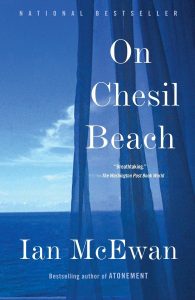If there is one indelible line among the many memorable words that form this compact novel, it is this: “The entire course of life can be changed – by doing nothing.”

Edward and Florence are newlyweds. They are “young, educated, and both virgins on this, their wedding night, and they lived in a time when a conversation about sexual difficulties was plainly impossible.”
The couple is as inexperienced at communication as they are in the carnal arts. Their courtship was “bound by protocols never agreed or voiced, but generally observed;” in other words, they had friendship – but no benefits. Florence abhors the notion of sex. She does not want to be “entered or penetrated,” verbs she found in a how-to handbook for brides. Edward, his perception warped by priapic frustration, misinterprets Florence’s reticence as a dormancy awaiting a passionate reawakening.
Perched uneasily aboard their honeymoon bed in an inn overlooking Chesil Beach in Dorset, England, Edward and Florence attempt to reconcile their fantasies – he yearning for relief from his passive torment, she determined dutifully to grin and, ahem, bare it. Then, in an instant, these dreams collide, revealing sharp edges that had been hidden behind the dullness of cordiality.
“On Chesil Beach” is set 1962, “when to be young was a social encumbrance, a mark of irrelevance, a faintly embarrassing condition for which marriage was the beginning of a cure.” McEwan, as artful as ever in nuance, and as theatrical as necessary when the tension tightens, captures the era perfectly: Edward and Florence are innocents, duped by cultural norms and lacking the means – neither language, patience nor honesty – to overcome their entrapment.
“On Chesil Beach” is a penetrating story of loss – of love, of opportunity, and of saying the right words at the right time. I highly recommend it.
